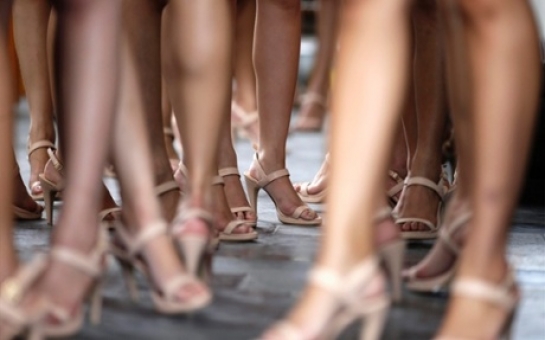No, “creepshots” aren’t protected by the First Amendment, which “does not protect purely private recreational, non-communicative photography”, according to a 2010 ruling. But they’re still running too rampant.It all depends on what camera angle the creeps are using, which body part they focus on and, until this week, which state they lived in.Yes, as of Wednesday, it was found to be perfectly legal to take “upskirt” shots of unsuspecting women on public transportation in the state of Massachusetts. Thank god the state legislature has now rushed through a bill to counter such a ridiculous ruling by the courts. (Update: Gov Deval Patrick has made upskirts illegal – officially.)The Massachusetts Supreme Judicial Court argued that the state’s so-called “peeping Tom” laws only applied to unwitting victims – nude or partially nude – who were photographed without their knowledge, in places like changing rooms or bathrooms. Which, apparently, had nothing to do with someone taking a photograph of your panties on the T because, well, like I said, it’s ridiculous:A female passenger on an MBTA trolley who is wearing a skirt, dress, or the like covering these parts of her body is not a person who is ‘partially nude”, no matter what is or is not underneath the skirt by way of underwear or other clothing.So, it’s a constitutional right to take pictures of things that are plainly visible in public spaces. But the Fourth Amendment and its right “to be secure in their persons” does a pretty good job of covering bodily autonomy, used as it is to defend abortion. Maybe somebody needs to remind the uncivilized men who take upskirts of that, whatever their temporary vantage point.Skirts generally do a pretty good job of covering flesh and undergarments you don’t want to expose – otherwise we’d just walk around in jeans or knickers. But as anyone who’s ever actually worn a skirt well knows, the only guaranteed way to render your skirt-clad lower body a chinkless fortress is to stitch it tightly around your legs until it resembles, well, a pair of trousers.Suddenly, the notion of “wearing the trousers” seems quite oppressive, and yet wearing a skirt makes you liable for intimate photographic invasion at all times. What’s a woman who doesn’t want to live in Puritan Times to do?Well, hope the Massachusetts law gets immediately dressed down in the statehouse, of course – which is on its way to happening, thank Sense. The new bill makes taking a creepshot or recording under or around a person’s clothing a Massachusetts misdemeanour, at least when a reasonable person would believe that their sexual or other intimate parts would not be visible to the public. The legislation would also make it illegal to take a photo or recording under or around a person’s clothing without their knowledge.I presume that catches not just the upskirters but the bum fetishists, forearm fetishists, knee fetishists and toe fetishists alike. And there are all sorts of photo fetish addicts out there, sharing their stolen picture-swag on forums across the internet. But something tells me we won’t be seeing a wave of prosecutions any time soon – at least not if the backlog of domestic violence, rape and restraining order cases are anything to go by. California, the only US state to institute a revenge porn law, did make two major prosecutions since it passed a law in October, but only time will tell as to whether that was merely a PR flurry.But there is ensuring that dust-jacketed legal tomes get more intimately acquainted with the 21st century, and then there are the many ways to catch a digital predator. Every time we institute a new law to deal with a tech-specific violation, we take money, time and resources away from from helping the real victims in a really tangible way, something Sarah Jeong, an editor of the Harvard Law and Gender Journal, argued when she wrote against the revenge porn law.We already know how America feels about what’s under a woman’s skirt: obsessed. Why else would the Republicans choose to protest Obamacare with that sinister ad featuring a lecherous Uncle Sam peering between a female patient’s gambs last year? Why else would women who choose to lift up their skirts with agency be so routinely slut-shamed?Once upon a time, teenagers lifted their dad’s porn mags as a rite of passage. Now, stealing women’s social media photos for the spank bank stretches out way past adolescence. Sure, they’re in the public domain; it’s not the same as upskirting without permission. But when it comes to image-making in the digital age, the key feminist concern should no longer be mere objectification. WE should be concerned about agency.At least the over-turning of the Massachusetts upskirt ruling will mean a woman can’t also be violated, if only someone can get the right Instagrammable angle.Meanwhile, the seamless automation of our devices – from subway to cellphone to Facebook in mere seconds – can only lull those with a blurred understanding of consent into a false sense of inhabiting a super highway freeman’s land. There, the only law that matters is the law of WiFi access.The bicycle, the washing machine, and now the mobile phone: technology has long been the handmaiden of women’s rights. Striking out laws that allow innovation to rob women of their bodily autonomy is the only way we can ensure that continues.(theguardian.com)ANN.Az
In a world where upskirt shots are legal, there can't be enough anti-creep laws
World
20:42 | 11.03.2014

In a world where upskirt shots are legal, there can't be enough anti-creep laws
Here’s the thing about picture-collecting voyeurism: desire may be amoral, but the act of taking iPhone photos of non-consenting individuals in order to get your rocks off doesn’t happen without consequences. There are personal repercussions. And there should be more legal punishment, too.
Follow us !










